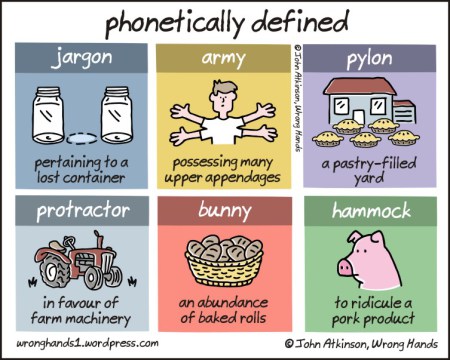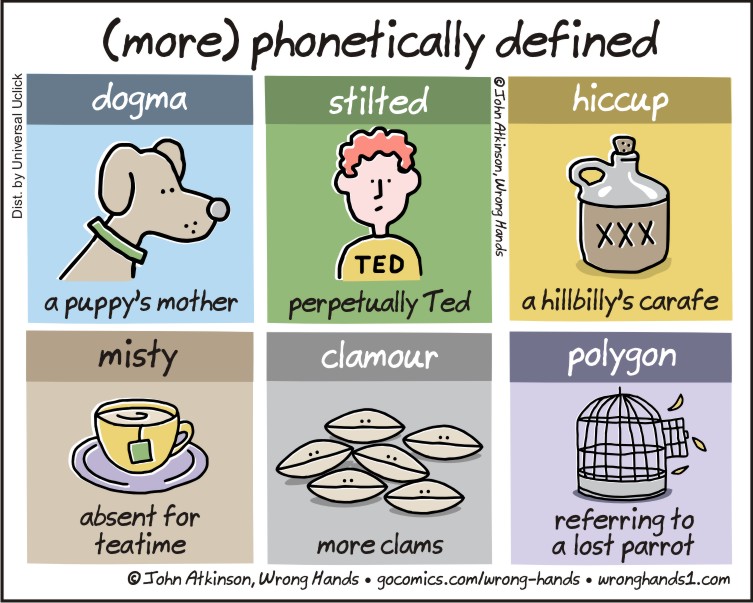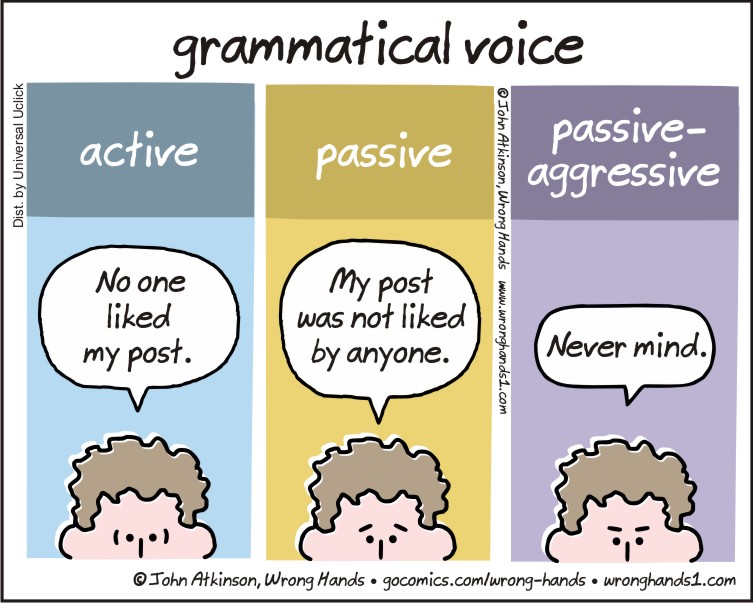"Phonetically defined"
« previous post | next post »
From Wrong Hands (here and here):

And again:

And on another topic:

[h/t Elise B.]
November 14, 2015 @ 2:35 pm · Filed by Mark Liberman under Linguistics in the comics
« previous post | next post »
From Wrong Hands (here and here):

And again:

And on another topic:

[h/t Elise B.]
November 14, 2015 @ 2:35 pm · Filed by Mark Liberman under Linguistics in the comics
Powered By WordPress
Michael Watts said,
November 14, 2015 @ 3:22 pm
The label says phonetically defined, but jargon, hammock, clamour, stilted, and arguably dogma and polygon all feature reduced vowels that conflict with the provided definition. :/
Mara K said,
November 14, 2015 @ 3:42 pm
So maybe it's phonemically defined.
Jerry Friedman said,
November 14, 2015 @ 3:45 pm
Yes, it's some weird combination of spelling and pronunciation. I don't know of any word that could replace "phonetically" in his title.
He writes "clamour", but he thinks "pylon" suggests "lawn". Is he Canadian? Yep, Ottawa.
Chas Belov said,
November 14, 2015 @ 3:58 pm
Actually, the only time I vividly recall hearing "pylon" pronounced, it was indeed pronounced "pie-lawn," in The Fugs' "Ramses the Second is Dead, My Love."
Chappers said,
November 14, 2015 @ 4:20 pm
The first two comics use much the same idea as the round on the BBC Radio 4 institution I'm Sorry I Haven't a Clue known as Uxbridge English Dictionary: a selection is available here, and there is a compiled book also available.
Thomas said,
November 14, 2015 @ 4:31 pm
Or, as Stephen Fry said on a British radio show:
"Countryside: killing Piers Morgan"
Jerry Friedman said,
November 14, 2015 @ 4:47 pm
But the Fugs are or were American, so they wouldn't write "clamour" (unless they would, for reasons for their own).
However, I may have missed some other possibilities. Might a Scot or an Irish person make that pun on "pylon"?
Brian said,
November 14, 2015 @ 5:00 pm
Is there something I'm missing with the pylon example? Is there some other way to pronounce it other than "pie-lawn"?
Keith Ivey said,
November 14, 2015 @ 5:12 pm
Brian, I think half of Americans or more distinguish between "Don" and "Dawn" and pronounce "pylon" with the "Don" vowel (no rounding).
Adrian said,
November 14, 2015 @ 5:46 pm
I didn't get the pylon example at all. Here in Britain it's definitely pie-lon. And like Chappers pointed out, although these wordplays are always quite funny, they are far from an original concept. Lazy humour, even.
D-AW said,
November 14, 2015 @ 7:50 pm
@adrian – do you not get "pylon"/"pie-lawn" because you don't call your domestic patch of grass a "lawn," or because the word "lawn" and the final syllable of "pylon" aren't the same for you?
I've actually never heard this word pronounced other than "pie-lawn", rhyming on both syllables with "nylon", anywhere in Canada, the US NE, or the UK where I've been. I assume the other US pronunciation is "pie-luhn?" with the vowels of "phylum" – and now I see m-w.com lists a schwa for their second pronunciation. In what parts of the US would one encounter this?
Keith Ivey said,
November 14, 2015 @ 8:19 pm
No, D-AW, the other US pronunciation is "pie-lahn". I gather that you don't distinguish between "lahn" and "lawn" (or "Don"/"Dawn", "cot"/"caught", and so on), but plenty of Americans do. And for many in the UK it's yet another vowel that you don't have in your dialect (and I don't either), so they can distinguish "bot", "bought", and "baht".
Tim Morris said,
November 14, 2015 @ 8:41 pm
How about "Acontextually and Analytically Morphophonemically Defined?"
That would really grab the casual comics reader :)
Gregory Kusnick said,
November 14, 2015 @ 8:58 pm
Surely "clamour", spelled that way, refers to clams in love.
Lai Ka Yau said,
November 14, 2015 @ 9:18 pm
@Mara K: But aren't 'stilted' and 'still Ted', 'jargon' and 'jar gone', etc., minimal pairs? In that case, the two vowels are in contrastive distribution, and are thus different phonemes…
D-AW said,
November 14, 2015 @ 9:27 pm
@keith – yeah I realized this as I pressed the submit button. But do you think the joke would really be lost on someone with cot/caught? I mean, isn't this the classic example of a distinction that everyone ignores, because we're all pretty much familiar with the variety of accents we encounter all the time?
When I first came down from Canada I wondered why anyone would want to brag about having "lats of pats" but I soon figured it out and haven't had a problem since (which is why I didn't, and don't, get the problem with pylon, I guess).
In any case it seems different to "hammock", which I've never heard said "ham-mock" (though I have heard "ham-hock", somewhere).
Rodger C said,
November 14, 2015 @ 9:52 pm
D-AW, are you saying you've heard a hammock confused with a hamhock?
Usually Dainichi said,
November 15, 2015 @ 1:33 am
@Lai Ka Yau
"But aren't 'stilted' and 'still Ted', 'jargon' and 'jar gone', etc., minimal pairs?"
Maybe that's why Mara K says "maybe" =). But I think you could argue that "gone" only has a different vowel than "-gon" when it's stressed. For example, in a sentence like "Has the jar gone out?" spoken quickly, stress would usually fall on "jar" and "out", and "gone" would have secondary or even no stress, and in the latter case the vowel might be reduced to something closer to a schwa… I think… I'm neither a phonetician nor a native English speaker.
Francis Boyle said,
November 15, 2015 @ 1:51 am
D-AW – I'm a speaker of Australian English with the cot/caught distinction and pylon had me stymied. (I had no trouble with any of the others.)
C Baker said,
November 15, 2015 @ 2:04 am
D-AW, those of us who say that "pylon" doesn't sound like "pie lawn" say the vowel in the word "lawn" with our lips rounded.
John Swindle said,
November 15, 2015 @ 2:44 am
I'm American and rhyme "pylon" with "Don" and not with "Dawn." But the American pronunciation of "pylon" with a schwa in the second syllable, mentioned by D-AW as cited by m-w.com, also exists. I've heard it for a traffic cone or that flexible upright post that similarly directs traffic, which I see is properly called a "traffic bollard" or "flexible delineator post."
Fabian said,
November 15, 2015 @ 4:40 am
Wow,
And I thought we Germans were too perfectionist in order to be funny… Guys, maybe you should calm down and forget your linguistic education for a second… This is not a scientific text and does not claim to be super correct (or is it me who misses the point here). It's simply hilarious IMHO.
Thank you for sharing!
Sili said,
November 15, 2015 @ 9:12 am
D-AW,
Nylon and pylon are perfect rhymes for me. Unfortunately, nylon doesn't rhyme with lawn, though.
I wondered about the lawn in the image as well, for that reason (thinking front yard rather than anything to do with grass). Pile-on was my first go-to for a pun.
Coby Lubliner said,
November 15, 2015 @ 10:10 am
Never mind "pylon" — does anyone actually pronounce "jrgon" with anything other than a schwa in the second syllable?
By the way, this kind of wordplay is found in cryptic crosswords all the time.
Coby Lubliner said,
November 15, 2015 @ 10:11 am
I meant "jargon".
Xtifr said,
November 15, 2015 @ 3:19 pm
I've heard "jargon" both ways, although a reduced vowel is far more common in my region (California).
On a topic unrelated to variations in pronunciation: I think the definition of "army" is actually reasonable. Not that it's something likely to come up very often, but after all, one of the accepted and well-documented definitions of "irony" is "contains iron".
Michael said,
November 15, 2015 @ 3:23 pm
My goodness, aren't we a bunch of pedants. There exists a kind of English where all syllables have their vowels pronounced as though English were some kind of normal language, where a primary teacher is lecturing a child how to spell. In! For! May! Shun!
Cf. Katy Perry's "unconditionally"
Ralph Hickok said,
November 15, 2015 @ 3:28 pm
This makes me think of the "Fractured French" and "Liberated Latin" books of my childhood. A typical "Fractured French" entry: "Jean d'Arc" = "The light is out in the bathroom."
a George said,
November 15, 2015 @ 7:03 pm
I think there are two phenomena at work here. One is the spelling, which may be entirely correct but ambiguous until you understand the context or hear it pronounced (protractor, hammock); here also belong the neologisms, like army and bunny.
The other is simply a similarity in pronunciation, but the spelling is more phonetic than correct (jargon, polygon).
"Zur Relevanz naturwissenschaftlicher Methoden für die Frage des Musikerlebens" was the title of a conference. It provoked me so much due to its ambiguity that I proposed a paper (which was accepted and which stressed the importance of sound recordings). Only by hearing it said can you immediately understand what the organisers meant.
Puns and jokes make life enjoyable. Even howlers!
Phil Ramsden said,
November 15, 2015 @ 7:58 pm
Uxbridge English Dictionary is a purer form of this gag, I think, because it's genuinely phonetic. (I think the comic standard is higher, too, though that may be a cultural difference.)
In a linguistics context, I'd like to mention one of my favourites, from Graeme Garden, which is interesting in that it only works with a Limey-style non-rhotic accent: "Buttercup: face down." Americans would once not have understood, but will now understand only too well, Stephen Fry's magnificent "Countryside: the murder of Piers Morgan."
There's a website you can go to to contribute your own, I think.
C Baker said,
November 16, 2015 @ 3:59 am
Michael, Fabian, I don't think you get the point. We just have different ways of appreciating the same joke. Now, we won't stop you from having fun your way, so please – show us all the same courtesy!
Ginger Yellow said,
November 16, 2015 @ 5:05 am
More Uxbridge English Dictionary examples (with citations!).
Eneri Rose said,
November 16, 2015 @ 9:05 am
This entire post exemplifies why authors should never attempt to write dialogue in "accents". I've never been able to read Mark Twain.
January First-of-May said,
November 16, 2015 @ 1:20 pm
The Russian version – which, to be fair, focuses mainly on orthography, and doesn't do purely sound-based reimaginings (though, admittedly, Russian orthography is much more phonemic than English orthography) – is Norman's Entymological Dictionary.
[Just for the record: no, I don't recall who or what Norman is; I've pretty much copied the name from an earlier comment of mine. But I definitely recall it being called an Entymological Dictionary (Энтимологический словарь)].
Grover Jones said,
November 17, 2015 @ 9:19 am
For many (most?) Americans, the most frequent use of "pylon" comes in watching/playing American football. I've never heard announcers call it anything other than "pie-lawn" in American football jargon.
Ralph Hickok said,
November 17, 2015 @ 11:43 am
There are also traffic pylons. I hear the second syllable pronounced by some as "lawn" and by others as in Lon Chaney's first name. But that's a bad way to put it, because those who pronounce it "pie-lawn" probably also say "Lawn Chaney."
Phil Ramsden said,
November 17, 2015 @ 12:53 pm
The pie-lawn thing is an example what of Labov called the Don/dawn merger, which seems (going on Wikipedia, like) to be present in all lects that exhibit the cot/caught merger (i.e. much of the US, nearly all of Canada, parts of Scotland and Ireland), and a few more besides.
It's often struck me that people are apt to get oddly indignant about merged and unmerged phonemes, and unusually intolerant from forms of speech that differ from their own in this respect. To some extent, the cross comments on here may reflect that.
FWIW, I speak a slightly Cockneyfied, slightly Mancunified British RP, in which the Don and dawn vowels are very distinct. My wife's from Toronto originally, and though she now speaks with a very Anglicised accent, she occasionally hypercorrects "balm" to (BE) "bomb" etc.
Phil Ramsden said,
November 17, 2015 @ 12:54 pm
Intolerant *of*, I meant. Damn you, LL, with your "no editing" thing.
Craig said,
November 18, 2015 @ 9:03 am
Once when I was a Mormon, I attended church services in a BYU student congregation which met in one of the university's classroom buildings.
After sacrament meeting (the main service), one of the leaders stood at the pulpit giving directions to tihe various classrooms where Sunday School was being taught. To my east coast ears, what he said sounded like: "Don will be teaching in room 1, and Don will be teaching in room 2."
I still have no idea how the locals differentiated Don and Dawn in what he was saying, although I suspect they just showed up in a room and left of it were the wrong teacher. :)
Jeff said,
November 23, 2015 @ 7:08 am
As a Southern American English speaker, I understand all of the puns, but very few are really apt for my dialect, in which 'gone' is pronounced with the 'Dawn' vowel, as is "on", in reference to the "pile-on" suggestion. In fact, there's a whole class of words that follow that pattern: want, honk, stomp, donkey, gonna, romp, . . . I'm even certain this difference even applies to at least some new words, as in Tonka Trucks and Willy Wonka.
Greg Morrow said,
November 23, 2015 @ 2:23 pm
Since most of the words involve morphemic reanalysis, "phonetic" seems inappropriate.